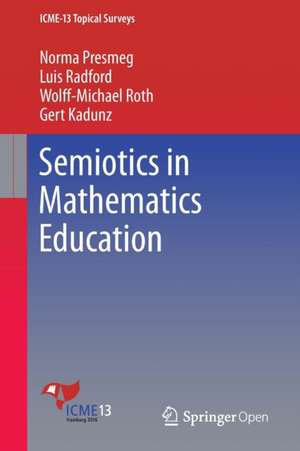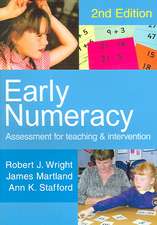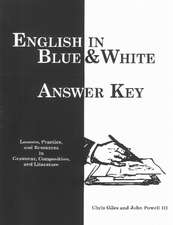Semiotics in Mathematics Education: ICME-13 Topical Surveys
Autor Norma Presmeg, Luis Radford, Wolff-Michael Roth, Gert Kadunzen Limba Engleză Paperback – 19 apr 2016
Din seria ICME-13 Topical Surveys
-
 Preț: 136.40 lei
Preț: 136.40 lei -
 Preț: 136.40 lei
Preț: 136.40 lei -
 Preț: 136.02 lei
Preț: 136.02 lei -
 Preț: 136.40 lei
Preț: 136.40 lei -
 Preț: 136.40 lei
Preț: 136.40 lei -
 Preț: 136.40 lei
Preț: 136.40 lei -
 Preț: 136.24 lei
Preț: 136.24 lei -
 Preț: 136.24 lei
Preț: 136.24 lei -
 Preț: 136.02 lei
Preț: 136.02 lei -
 Preț: 136.24 lei
Preț: 136.24 lei -
 Preț: 136.40 lei
Preț: 136.40 lei -
 Preț: 136.24 lei
Preț: 136.24 lei -
 Preț: 136.02 lei
Preț: 136.02 lei -
 Preț: 136.02 lei
Preț: 136.02 lei -
 Preț: 136.40 lei
Preț: 136.40 lei -
 Preț: 135.47 lei
Preț: 135.47 lei -
 Preț: 136.02 lei
Preț: 136.02 lei -
 Preț: 135.85 lei
Preț: 135.85 lei -
 Preț: 137.38 lei
Preț: 137.38 lei -
 Preț: 136.02 lei
Preț: 136.02 lei -
 Preț: 136.77 lei
Preț: 136.77 lei -
 Preț: 136.99 lei
Preț: 136.99 lei -
 Preț: 136.02 lei
Preț: 136.02 lei -
 Preț: 136.40 lei
Preț: 136.40 lei -
 Preț: 136.77 lei
Preț: 136.77 lei
Preț: 136.40 lei
Nou
Puncte Express: 205
Preț estimativ în valută:
26.11€ • 28.37$ • 21.95£
26.11€ • 28.37$ • 21.95£
Carte tipărită la comandă
Livrare economică 22 aprilie-06 mai
Preluare comenzi: 021 569.72.76
Specificații
ISBN-13: 9783319313696
ISBN-10: 331931369X
Pagini: 40
Ilustrații: VII, 40 p. 4 illus. in color.
Dimensiuni: 155 x 235 x 3 mm
Greutate: 0.09 kg
Ediția:1st ed. 2016
Editura: Springer International Publishing
Colecția Springer
Seria ICME-13 Topical Surveys
Locul publicării:Cham, Switzerland
ISBN-10: 331931369X
Pagini: 40
Ilustrații: VII, 40 p. 4 illus. in color.
Dimensiuni: 155 x 235 x 3 mm
Greutate: 0.09 kg
Ediția:1st ed. 2016
Editura: Springer International Publishing
Colecția Springer
Seria ICME-13 Topical Surveys
Locul publicării:Cham, Switzerland
Cuprins
1. Introduction.- 2. Semiotics in theory and practice in mathematics education.- 3. A summary of results.- References.
Textul de pe ultima copertă
This volume discusses semiotics in mathematics education as an activity with a formal sign system, in which each sign represents something else. Theories presented by Saussure, Peirce, Vygotsky and other writers on semiotics are summarized in their relevance to the teaching and learning of mathematics. The significance of signs for mathematics education lies in their ubiquitous use in every branch of mathematics. Such use involves seeing the general in the particular, a process that is not always clear to learners. Therefore, in several traditional frameworks, semiotics has the potential to serve as a powerful conceptual lens in investigating diverse topics in mathematics education research. Topics that are implicated include (but are not limited to): the birth of signs; embodiment, gestures and artifacts; segmentation and communicative fields; cultural mediation; social semiotics; linguistic theories; chains of signification; semiotic bundles; relationships among various sign systems; intersubjectivity; diagrammatic and inferential reasoning; and semiotics as the focus of innovative learning and teaching materials.
Caracteristici
Addresses learning and teaching using signs and sign systems that are ubiquitous in mathematics Powerful theoretical lenses from the semiotic theories of Saussure, Peirce, Vygotsky and others are applied to mathematics education and its research Addresses a variety of current topics in mathematics education research, including chains of signification, semiotic bundles, semiotic and cultural mediation, gestures and embodiment, the birth of signs and communicative fields Includes supplementary material: sn.pub/extras










